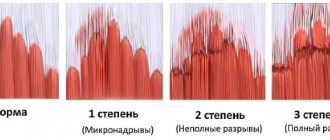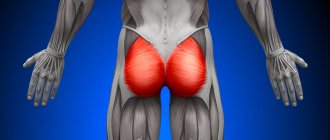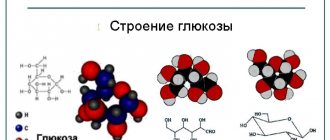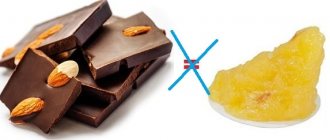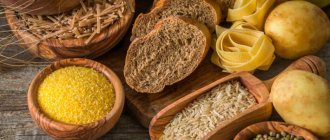Glycogen is a “reserve” carbohydrate in the human body, belonging to the class of polysaccharides.
It is sometimes mistakenly called "glucagon". It is important not to confuse both names, since the second term is a protein hormone that indirectly, through specific glucagon receptors in the liver, causes increased catabolism of glycogen deposited in the liver, i.e. serves as an external signal for hepatocytes (liver cells) to release glucose into the blood due to the breakdown of glycogen (glycogenolysis) or the synthesis of glucose from other substances (gluconeogenesis). It causes an increase in insulin secretion from healthy pancreatic cells.
Where are stocks stored?
Content:
- What is glycogen?
- Where are stocks stored?
- Biochemical properties
- The role of glycogen
- Synthesizing
- Glycogenosis and other disorders
- The body's need for glycogen
- Food for glycogen storage
- Effect of glycogen on body weight
- Deficit and surplus: how to determine
Glycogen reserves in the form of tiny granules are stored in the liver and muscle tissue. This polysaccharide is also found in the cells of the nervous system, kidneys, aorta, epithelium, brain, embryonic tissues and the mucous membrane of the uterus. The body of a healthy adult usually contains about 400 g of the substance. But, by the way, during increased physical activity the body predominantly uses glycogen from muscles. Therefore, bodybuilders should additionally saturate themselves with high-carbohydrate foods approximately 2 hours before training in order to restore their reserves of the substance.
Where is it contained and what are the functions?
Where glycogen is stored for later use:
In the liver
Inclusions of glycogen in liver cells
The main stores of glycogen are in the liver and muscles. The amount of glycogen in the liver can reach 150 - 200 g in an adult . Liver cells are the leaders in the accumulation of glycogen: they can of 8% of this substance.
The main function of liver glycogen is to maintain blood sugar levels at a constant, healthy level .
The liver itself is one of the most important organs of the body (if it is even worth holding a “hit parade” among the organs that we all need), and the storage and use of glycogen makes its functions even more responsible: high-quality functioning of the brain is possible only thanks to normal sugar levels in the body .
If the blood sugar level decreases, then an energy deficiency occurs, due to which the body begins to malfunction. Lack of nutrition for the brain affects the central nervous system, which becomes depleted. This is where glycogen breakdown occurs. Then glucose enters the blood, thanks to which the body receives the necessary amount of energy.
Let us also remember that in the liver not only the synthesis of glycogen from glucose occurs, but also the reverse process - the hydrolysis of glycogen to glucose. This process is caused by a decrease in blood sugar concentration as a result of the absorption of glucose by various tissues and organs.
In the muscles
Glycogen is also deposited in muscles. The total amount of glycogen in the body is 300 - 400 grams. As we know, about 100-120 grams of the substance accumulates in liver cells, but the rest ( 200-280 grams ) is stored in the muscles and makes up a maximum of 1 - 2% of the total mass of these tissues.
Although, to be as precise as possible, it should be noted that glycogen is not stored in muscle fibers, but in sarcoplasm - the nutrient fluid surrounding the muscles.
The amount of glycogen in muscles increases in the case of abundant nutrition and decreases during fasting, and decreases only during physical activity - prolonged and/or intense.
When muscles work under the influence of a special enzyme phosphorylase, which is activated at the beginning of muscle contraction, increased breakdown of glycogen in the muscles occurs, which is used to provide glucose for the work of the muscles themselves (muscle contractions). Thus, muscles use glycogen only for their own needs.
Intense muscular activity slows down the absorption of carbohydrates, while light and short work enhances the absorption of glucose.
Liver and muscle glycogen are used for different needs, but to say that one of them is more important is absolute nonsense and only demonstrates your wild illiteracy.
Everything that is written on this screen is complete heresy. If you are afraid of fruits and think that they are directly stored in fat, then do not tell this nonsense to anyone and urgently read the article Fructose: is it possible to eat fruits and lose weight?
Biochemical properties
Chemists call a polysaccharide with the formula (C6H10O5)n glycogen. Another name for this substance is animal starch. And although glycogen is stored in animal cells, this name is not entirely correct. The substance was discovered by the French physiologist Bernard. Almost 160 years ago, a scientist first discovered “spare” carbohydrates in liver cells.
“Spare” carbohydrate is stored in the cytoplasm of cells. But if the body experiences a sudden lack of glucose, glycogen is released and enters the blood. But, interestingly, only the polysaccharide accumulated in liver cells (hepatocytes) can transform into glucose, which can saturate a “hungry” body. Glycogen reserves in it can reach 5% of its mass, and in an adult body be about 100-120 g. Glycogen in hepatocytes reaches its maximum concentration approximately an hour and a half after a meal rich in carbohydrates (confectionery, flour, starchy foods).
In muscle composition, the polysaccharide occupies no more than 1-2% of the tissue mass. But, taking into account the total muscle mass, it becomes clear that the glycogen “deposits” in the muscles exceed the reserves of the substance in the liver. There are also small reserves of carbohydrate in the kidneys, glial cells of the brain and leukocytes (white blood cells). Thus, the total glycogen reserves in an adult body can amount to almost half a kilogram.
Interestingly, the “spare” polysaccharide is found in the cells of some plants, fungi (yeast) and bacteria.
The role of glycogen
Glycogen is mainly concentrated in liver and muscle cells. And it should be understood that these two sources of reserve energy have different functions. Polysaccharide from the liver supplies glucose to the body as a whole. That is, it is responsible for the stability of blood sugar levels. With excessive activity or between meals, plasma glucose levels decrease. And in order to avoid hypoglycemia, glycogen contained in liver cells is broken down and enters the bloodstream, leveling the glucose level. The regulatory function of the liver in this regard cannot be underestimated, since a change in sugar levels in any direction is fraught with serious problems, even death.
Muscle reserves are necessary to maintain the functioning of the musculoskeletal system. The heart is also a muscle that stores glycogen. Knowing this, it becomes clear why most people develop heart problems after prolonged fasting or with anorexia.
But if excess glucose can be stored in the form of glycogen, then the question arises: “Why are carbohydrate foods stored on the body as fat?” There is also an explanation for this. Glycogen reserves in the body are not dimensionless. With low physical activity, animal starch reserves do not have time to be used up, so glucose accumulates in another form - in the form of lipids under the skin.
In addition, glycogen is necessary for the catabolism of complex carbohydrates and participates in metabolic processes in the body.
How to replenish glycogen levels?
Many Western experts consider glycogen to be the main supplier of energy for muscle activity (for example, in the book Brukner P., Khan K. Clinical sports medicine. - New York: McGraw-Hill Professional, 2008). Thus, as a result of the training process greatly depleted , all this naturally has a negative effect on the training of athletes, so it is necessary to promptly and correctly replenish the reduced level of stored carbohydrates.
To replenish energy costs, the athlete must choose foods that contain a high amount of carbohydrates, while the shifted type , complex/simple, excess glucose in the blood will be used to restore glycogen levels.
How to replenish glycogen costs?
Try to choose foods rich not only in complex and simple carbohydrates, but also in vitamins and minerals, in the absence of harmful additives (flavor and aroma enhancers, preservatives: E620, E621, E627, E951, E210, E211 , E216, E270 and a number of others, We will make a separate article on this topic). Cereals , rice, bananas, pasta, nuts, fruits and vegetables are good for such purposes
In percentage terms, carbohydrates in the menu should account for about 60-70% per day. Accordingly, if you are prone to gaining excess weight, then consume mainly complex carbohydrates.
Synthesizing
Glycogen is a strategic reserve of energy that is synthesized in the body from carbohydrates.
First, the body uses the carbohydrates received for strategic purposes, and stores the remainder “for a rainy day.” Energy deficiency is the reason for the breakdown of glycogen into the state of glucose.
The synthesis of the substance is regulated by hormones and the nervous system. This process, particularly in the muscles, is “triggered” by adrenaline. And the breakdown of animal starch in the liver activates the hormone glucagon (produced by the pancreas during fasting). The hormone insulin is responsible for the synthesis of “reserve” carbohydrates. The process consists of several stages and occurs exclusively during meals.
Glycogenosis and other disorders
But in some cases, glycogen breakdown does not occur. As a result, glycogen accumulates in the cells of all organs and tissues. Typically, such a disorder is observed in people with genetic disorders (dysfunction of the enzymes necessary to break down the substance). This condition is called glycogenosis and is included in the list of autosomal recessive pathologies. Today, 12 types of this disease are known in medicine, but so far only half of them have been sufficiently studied.
But this is not the only pathology associated with animal starch. Glycogen diseases also include aglycogenosis, a disorder accompanied by a complete absence of the enzyme responsible for glycogen synthesis. Symptoms of the disease are pronounced hypoglycemia and convulsions. The presence of aglycogenosis is determined by liver biopsy.
The body's need for glycogen
Glycogen, as a reserve source of energy, is important to restore regularly. So, at least, scientists say. Increased physical activity can lead to a total depletion of carbohydrate reserves in the liver and muscles, which will ultimately affect a person’s vital activity and performance. As a result of a long-term carbohydrate-free diet, glycogen reserves in the liver are reduced to almost zero. Muscle reserves are depleted during intense strength training.
The minimum daily dose of glycogen is 100 g and above. But it is important to increase this figure when:
- intense physical activity;
- increased mental activity;
- after “starvation” diets.
On the contrary, people with liver dysfunction and enzyme deficiency should be careful about foods rich in carbohydrates.
How long does it take to spend?
- How food turns into fat: no, carbohydrates and sugar do not go into fat - 6 myths
- One is tasty, the other is healthy: 2000 kcal diets with BJU
- How many minutes of training will it take for fat to burn?
[Total votes: 5 Average: 5/5]
Bone Wide
This article was reviewed by a certified nutritionist who has a bachelor's degree in nutrition and dietetics, D. G. Veremeev.
Articles are for informational and educational purposes only and are not a substitute for professional medical advice, diagnosis, or treatment. Always consult your physician with any questions you may have about a medical condition.
Effect of glycogen on body weight
Scientists have determined that about 400 grams of glycogen can accumulate in an adult body. But scientists also determined that each gram of reserve glucose binds approximately 4 grams of water. So it turns out that 400 g of polysaccharide is approximately 2 kg of glycogen aqueous solution. This explains profuse sweating during exercise: the body uses up glycogen and at the same time loses 4 times more fluid.
This property of glycogen also explains the quick results of express diets for weight loss. Low-carbohydrate diets provoke intensive consumption of glycogen, and with it fluids from the body. One liter of water, as you know, is 1 kg of weight. But as soon as a person returns to a normal diet containing carbohydrates, animal starch reserves are restored, and with them the liquid lost during the diet. This is the reason for the short-term results of express weight loss.
For truly effective weight loss, doctors advise not only to revise your diet (give preference to proteins), but also to increase physical activity, which leads to rapid consumption of glycogen. By the way, researchers have calculated that 2-8 minutes of intense cardio training is enough to use glycogen stores and lose excess weight. But this formula is suitable only for people who do not have cardiac problems.
Glycogen stores and training
Glycogen is the main energy carrier and directly affects athletes’ training:
- intense loads can deplete reserves by 80%;
- after training, the body needs recovery; as a rule, preference is given to fast carbohydrates;
- under load, the muscles are filled with blood, which increases the glycogen depot due to an increase in the size of cells that can store it;
- Glycogen enters the blood until the pulse exceeds 80% of the maximum heart rate. An insufficient amount of oxygen causes the oxidation of fatty acids - the principle of effective drying during preparation for competitions;
- the polysaccharide does not affect strength indicators, only endurance.
The relationship is obvious: high-repetition exercises deplete reserves more, which leads to an increase in glycogen and the number of final repetitions.



